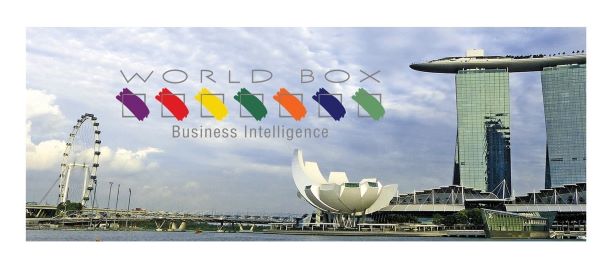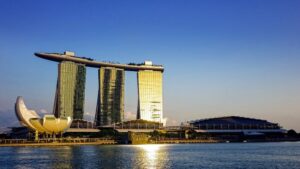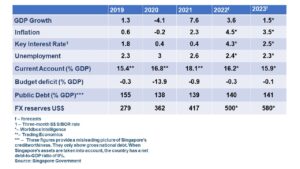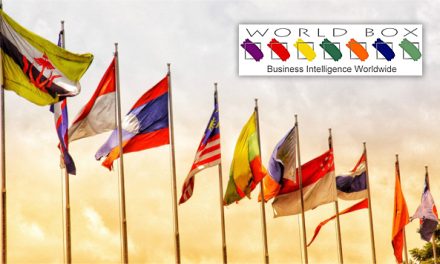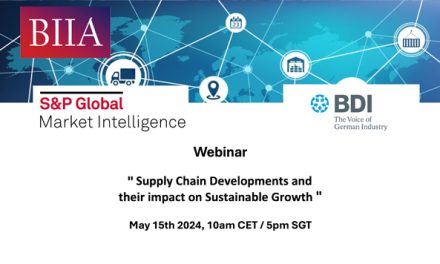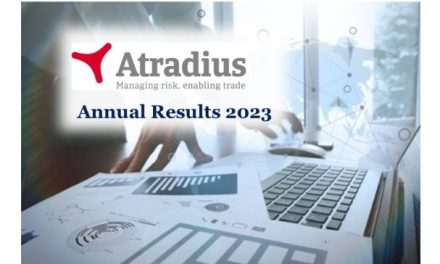Worldbox Intelligence Risk Rating March 2023
SINGAPORE
Overall Score 26- Stable
Political risk: Stable 9/10
Economic risk: Stable 8/10
Commercial risk: Stable 9/10
The risk assessment of a country is made up of 3 components, being Political, Economic and Commercial. Each component is scored out of 10, with 10 being the lowest risk and 1 the highest.
Political Risk – Stable at 9
Singapore remains one of the most stable countries in the world. The People’s Action Party (PAP), which has been the main governing party since gaining independence from Malaysia in 1965, was re-elected in July 2020. Amid a COVID-induced economic slump, the PAP’s share of the popular vote slid to 61%, its second-worst result on record. However, there are no significant implications for political risk. Abrupt policy changes are unlikely, given the PAP´s still-strong mandate to govern and pass legislation.
In April 2022 Prime Minister Lee Hsien Loong announced that Finance Minister Lawrence Wong was in pole position to take over the premiership when Lee steps down. Lee announced that Wong will lead the PAP’s “fourth generation” or “4G” team, effectively making the 49-year-old the heir apparent to assume the top job whenever Lee, 70, calls an end to his career. There has been no decision on whether DPM Wong will take over from PM Lee before the next general election, which is due by November 2025 at the earliest.
Wong’s performance as co-chair of the city-state’s COVID-19 task force, along with his relatable image, impressed as the PAP seeks to attract a younger set of voters.
Lee, 70, son of the country’s founding father Lee Kuan Yew, has been in office since 2004 and once said he had no desire to remain in office after reaching 70. No significant policy changes are expected when and if Wong does succeed the current prime minister.
Meanwhile, the establishment of an official “Leader of the Opposition,” a newly instituted role in Singapore, is likely to strengthen checks and balances and lead to a more consultative form of governance that potentially improves accountability. The next general election must be called by 2025.
Economic Risk – Stable at 8
Singapore has the highest possible sovereign credit ratings from Moody’s, Fitch and S&P. Singapore’s large fiscal and external buffers are often better than those of other highly-rated countries. Robust institutions and governance alongside effective policy implementation supports fiscal strength and broad financial stability, and provides plenty of scope to counter cyclical downturns and any long-term structural challenges.
Singapore entered a sharp recession in 2020 as a result of the COVID-19 pandemic. The government adopted highly expansionary fiscal and monetary policies to support the economy. It committed close to S$100 billion through five budgets in financial year 2020. That produced its largest budget deficit since independence. The fiscal measures targeted infrastructure projects that should boost long-term growth. The policy response helped the economy bounce back strongly in 2021, when it recorded growth of 7.6%, the fastest full-year growth since 2010’s record of 14.5%.
Growth slowed in 2022 to 3.6%, weighed down by a weaker global economy. But the budget deficit also shrank dramatically to 0.3% of GDP. In the budget announced in February 2023, Finance Minister Lawrence Wong forecast a deficit equal to 0.1% of GDP, so the government finances have effectively returned to balance. The budget sought to address the impact of relatively high inflation on Singaporeans. It set aside $2.6 billion (0.4% of GDP) for special transfers to households to cushion the impact of higher prices, and enhanced support to help businesses invest in energy efficiency and defray salary increases for lower-wage workers.
Commercial Risk – Stable at 9
Singapore consistently ranks as one of the best economies in the world in which to operate. It ranks second out of a possible 190 economies on the World Bank’s ease of doing business scorecard, for example, only behind New Zealand. The republic excels in all areas of doing business, particularly enforcing contracts, protecting minority investors, starting a business, dealing with construction permits and paying taxes. The Singaporean government places a strong emphasis on implementing policies to enhance the business environment and encourage investment.
The country ranks in first place in terms of economic freedom, according to the Heritage Foundation. Although certain civil liberties remain restricted, the PAP has championed economic liberalization and international trade.
It is also one of the least corrupt societies in the world, ranking fifth in Transparency International’s (TI) 2022 Corruption Perceptions Index. Singapore is again the only Asian country ranked in the top 10. Singapore has tackled corruption decisively and garnered international recognition for its incorruptibility and clean public sector, according to TI.
Singapore benefits from excellent infrastructure, reflecting high levels of investment supported by years of political stability and economic prosperity. The country hosts superb transport links, for example, and its nationwide fibre network provides its citizens with among the fastest home internet speeds in the world.
March Bulletin
Political Risk – Stable at 9
The PAP won 83 out of 95 seats in the July 2020 election and will continue to dominate the political environment for the foreseeable future. The biggest opposition group, the Workers’ Party, had its best result to date, but emerged with just 10 seats. The next election is due by 2025.
Deputy Prime Minister Lawrence Wong is all but guaranteed to become the country’s fourth prime minister. Wong’s political views are unknown. He is not associated with any major policy initiative or key political ideas. He does have a reputation of being a good administrator.
However, he has acknowledged that many Singaporeans feel “anxiety” about being forced to compete with foreigners for jobs, and vowed to put Singaporeans “at the centre of everything we do”. Balancing the resentment felt by many Singaporeans at the influx of foreign workers and the needs of the economy for highly- skilled workers is likely to prove one of his most challenging tasks.
The proportion of overseas workers on temporary visas has risen dramatically over the past half-century, from 3.2% in 1970 to 33% in 2020. Most are low-paid manual or domestic workers. But much of the resentment is directed at highly paid professionals, many of whom work in the key finance sector. Wong has already vowed to introduce a more progressive tax system, and plans to raise taxes on the richest earners.
The other main challenges include balancing Singapore’s close relations with both China and the US, a difficult task given both powers are battling for influence in the region and given the escalating tensions over Taiwan.
Economic Risk – Stable at 8
The economy grew by just 2.1% on an annual pace in Q4 2022, half the average pace of 4.2% recorded in the preceding quarters of the year. The slowdown reflected sluggish external demand. In February 2023, the Monetary Authority of Singapore (MAS) said it expected global manufacturing to remain weak in the first half of 2023 and that consequently Singapore’s GDP growth would also likely stay muted in, before picking up in the latter half of the year.
The central bank added that while China’s earlier-than-expected exit from its zero COVID policy could impart some upsides to 2023 growth, the boost might not be significant, given that the re-opening will largely benefit China’s domestic-facing services. MAS expects GDP growth to ease to 0.5–2.5% in 2023, from 3.6% last year.
The key core inflation measure stood at 5.1% on an annual basis in Q4 2022, unchanged from Q3, as larger price increases for food services and non-cooked food were broadly offset by a smaller rise in electricity & gas and travel-related services costs. For 2022 as a whole, headline and core inflation averaged 6.1% and 4.1% respectively. In 2023, MAS anticipates headline and core inflation to average 5.5–6.5% and 3.5–4.5%, respectively. MAS estimates that an increase in the Goods and Service Tax in January 2023 will cause inflation to be one full percentage point higher than would otherwise be the case.
The central bank has responded to higher inflation by tightening monetary policy. Rather than varying interest rates, the central bank manages policy by letting the local dollar rise or fall against the currencies of its main trading partners within an undisclosed band. The central bank has allowed the currency to appreciate on four occasions in 2022 in the hope of containing imported inflation, the latest adjustment taking place in October. Analysts appear split on whether MAS will tighten monetary policy when it reviews policy again in April 2023.
Commercial Risk – Stable at 9
Singapore remains one of the best countries in the world to conduct business. Corporate default probability remains very low on average, and the banking system is strong. In January 2023 S&P Global said that the three largest banks – DBS Group Holdings Ltd., Oversea-Chinese Banking Corp. Ltd., or OCBC, and United Overseas Bank Ltd., or UOB, entered 2023 with strong profitability and asset quality metrics after logging hefty profits in the first three quarters of 2022, owing to higher interest income and improving margins. However, the ratings agency added that the banks could see a possible uptick in bad loans and softer loan growth in 2023 as macroeconomic conditions grow more challenging.
Latest economic data
Useful Links
https://www.amro-asia.org/
https://www.transparency.org/en/cpi/2021
https://www.imf.org/en/Countries/SGP
https://www.straitstimes.com/global
https://asiatimes.com/
https://thediplomat.com/
About Worldbox Business Intelligence
Worldbox Business Intelligence, headquartered in Switzerland, is a Global API data solution provider of business intelligence and used in data analytics.
We offer data in a standardised structure for more effective integration into client applications. Our own global network of subsidiaries, branches and desks allows us to precisely collect data efficiently and target key territories for clients.
With the Global API solution Worldbox Business Intelligence enables clients and partners also a frictionless real time onboarding, KYC and compliance verification while rapid global investigations are provided, if needed.
Worldbox Business Intelligence provides global data in a standardised structure to more than 160 Million companies worldwide. The global network of subsidiaries, branches and desks allows to precisely and efficiently collect data and target key territories for clients and partners.”
“Worldbox Business Intelligence – Bringing Swiss Precision To Data “
Copyright (C) 2023 Worldbox Business Intelligence. All rights reserved.
Our mailing address is:
Worldbox Business Intelligence
Breitackerstrasse 1
Zollikon
Zurich 8702
Switzerland
